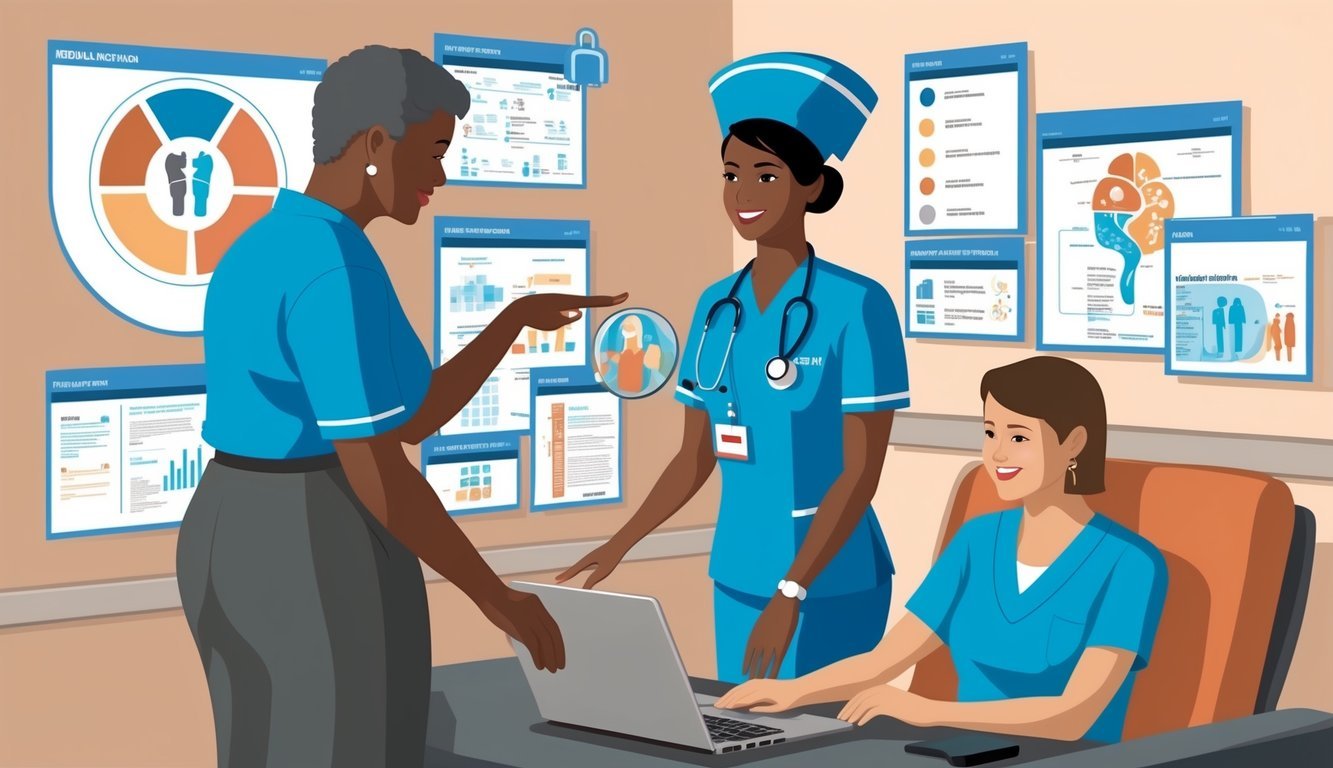Navigating the healthcare system can be overwhelming for many patients, especially during complex treatments.
A nurse navigator plays a crucial role in guiding patients through these challenges.
Nurse navigators offer personalized support to ensure you understand your diagnosis, treatment options, and follow-up care.
These skilled registered nurses work closely with patients, families, and healthcare teams, particularly in fields like oncology and chronic disease management.
They help you schedule appointments, access resources, and understand your healthcare journey while advocating for your needs.
With their support, patients often experience improved outcomes and a better understanding of their care.
As the demand for healthcare professionals continues to grow, the role of nurse navigators has become more significant.
You might be interested in how you can become one, the impact they have on patient experiences, and how this career path can advance within the healthcare field.
Key Takeaways
- Nurse navigators enhance patient care by guiding individuals through complex healthcare processes.
- The role involves assisting with treatment plans and connecting patients to necessary resources.
- A career as a nurse navigator offers various paths and opportunities for growth in healthcare.
Role and Responsibilities of a Nurse Navigator
A nurse navigator plays a vital role in providing support and guidance to patients, especially in complex areas like oncology and cancer care.
Your responsibilities will focus on patient advocacy, coordination of care, and educational support to ensure patient-centered care.
Patient Advocacy and Emotional Support
As a nurse navigator, you serve as a crucial advocate for your patients.
You ensure their needs are heard and met throughout their healthcare journey.
This involves active listening and demonstrating empathy during sensitive discussions.
Your role includes helping patients navigate their feelings and concerns about diagnoses, treatment options, and prognosis.
You might provide emotional support during tough times, ensuring patients feel understood and valued.
Studies show that effective patient advocacy directly improves patient satisfaction scores.
You also act as a bridge between patients and healthcare providers, simplifying medical jargon and promoting open communication.
Additionally, you help patients express their concerns, preferences, and questions, ensuring they are an integral part of their care decisions.
Coordination of Care and Resource Management
You coordinate the many aspects of a patient’s care to ensure seamless transitions between different healthcare services.
This involves scheduling appointments, arranging for tests, and following up on treatments.
In oncology, for example, you manage timelines and protocols for treatments like chemotherapy or radiation therapy.
Care coordination minimizes delays and ensures patients receive timely and appropriate care.
Resource management is also part of your role.
You connect patients with community resources, financial assistance, and support groups.
This holistic approach to care helps reduce barriers and improves patient access to essential services, ultimately fostering a patient-centered care environment.
Educational Support and Informed Decision-Making
Education is a key focus as you guide patients through complex healthcare systems.
You help explain diagnoses, treatment options, and potential side effects to empower patients in their decision-making process.
Using clear language and relatable examples, you translate technical information into digestible content.
This enhances understanding and aligns treatment plans with patients’ values and preferences.
Moreover, you encourage questions and discussions, ensuring patients feel confident and informed about their choices.
You facilitate group education sessions or provide individual counseling to enhance literacy in healthcare, specifically in cancer care contexts.
With strong communication skills, you play a vital role in promoting informed decisions and boosting overall patient satisfaction.
Paths to Becoming a Nurse Navigator
To become a nurse navigator, you need the right education and practical experience.
Both nursing degrees and clinical experience play crucial roles in this career path.
Here are the essential steps to take.
Nursing Degrees and Certifications
The first step toward becoming a nurse navigator is obtaining a nursing degree.
You can choose between an Associate Degree in Nursing (ADN) or a Bachelor of Science in Nursing (BSN).
| Degree Type | Duration | Key Features |
|---|---|---|
| ADN | 2 years | Offered at community colleges; prepares for NCLEX-RN. |
| BSN | 4 years | Comprehensive program; covers leadership and public health. |
After completing your degree, you need to pass the NCLEX-RN exam to obtain your RN license. A license is mandatory to practice as a registered nurse.
Once you are licensed, you can pursue additional certifications, such as nurse navigator certification, to enhance your skills in navigating patient care.
Clinical Experience and Licensure
Gaining clinical experience is essential for becoming a nurse navigator.
You should work in various healthcare settings, including hospitals and outpatient clinics.
This exposure helps you understand patient needs and the healthcare system better.
Most employer requirements include at least 2-3 years of clinical experience as a registered nurse.
In addition to your RN license, some positions may require certification in a nursing specialty.
This certification could include areas such as pediatrics, geriatrics, or oncology.
Engaging in continual education and training is vital.
It keeps you updated on healthcare practices and improves your ability to assist patients effectively.
The Significance of Nurse Navigators in Oncology

Nurse navigators play a crucial role in guiding oncology patients through their cancer treatment journey.
They provide invaluable support and expert coordination of care, helping patients understand their treatment options and manage their care plans effectively.
Cancer Patient Support and Care Coordination
As you navigate the complex world of cancer care, oncology nurse navigators serve as your primary point of contact.
They help you understand each step of the treatment process, including:
- Patient Education: Providing clear information about your diagnosis and treatment options.
- Emotional Support: Offering compassion and understanding during a challenging time.
- Coordination of Care: Ensuring that your various healthcare providers communicate effectively.
- Resource Connection: Linking you to support services, such as counseling or financial assistance.
These navigators work with your healthcare team to create tailored care plans that meet your unique needs.
Their support can significantly improve your experience and outcomes, making the cancer journey more manageable.
Oncology Nurse Navigator Expertise
Oncology nurse navigators possess specialized knowledge that enhances your care.
They are trained to understand various aspects of cancer treatment, including:
- Treatment Protocols: Familiarity with current guidelines and best practices.
- Clinical Trials: Awareness of available trials that may benefit you.
- Patient Advocacy: Representing your interests within the healthcare system.
Their expertise allows them to educate you on treatment options and guide you through the decision-making process.
By leveraging their skills, you gain a better understanding of your diagnosis and the steps you need to take, empowering you to be an active participant in your care journey.
Improving Patient Outcomes with Nurse Navigation
Nurse navigators play a vital role in enhancing patient experiences and outcomes.
Their support goes beyond medical care, focusing on empathy, compassion, and personalized approaches tailored to individual needs.
This leads to better management of chronic diseases and improved overall satisfaction.
Impacts on Patient Outcomes and Satisfaction
Nurse navigators significantly impact patient outcomes by providing support throughout the healthcare process.
They serve as a bridge between patients and healthcare providers, ensuring that communication is clear and effective.
Key benefits include:
- Enhanced Communication: They facilitate dialogue between patients and medical teams, reducing misunderstandings.
- Increased Satisfaction: Many patients report higher satisfaction rates due to the personalized attention they receive. A study indicated that patients with nurse navigators had a 26% higher satisfaction rate.
- Improved Health Outcomes: Patients often experience better health results due to timely follow-ups and care coordination, which helps address issues earlier.
Chronic Disease Management and Personalized Care
Managing chronic diseases requires a personalized approach, which nurse navigators excel at delivering.
They tailor their support based on individual patient needs, ensuring a comprehensive care plan.
Key elements include:
- Customized Care Plans: Nurse navigators work with patients to create specific plans that address their unique health challenges. This personalized care leads to better adherence to treatment.
- Regular Monitoring: The continued oversight helps catch potential health issues before they escalate, promoting stability in patients with chronic conditions.
- Empathy and Support: Their compassionate approach fosters trust, making patients feel valued and understood, which can motivate adherence to care plans.
By trusting nurse navigators, you can expect an improved healthcare experience that emphasizes your well-being.
Their expertise helps create a supportive environment essential for effective chronic disease management.
Career Opportunities and Advancements for Nurse Navigators
Nurse navigators play a crucial role in guiding patients through the healthcare system.
Their career opportunities have expanded in recent years, particularly in telehealth and specialized fields such as oncology nursing.
Understanding job growth and the importance of continuing education is essential for advancement in this profession.
Job Outlook and Career Growth
The demand for nurse navigators is on the rise due to the increasing complexity of healthcare.
You can find opportunities in various settings, including hospitals, outpatient clinics, and telehealth services.
| Job Setting | Average Salary |
|---|---|
| Hospitals | $82,498 – $98,402 |
| Outpatient Clinics | $63,433 |
| Telehealth Services | Varies significantly |
The growth in telehealth has made it easier for navigators to support patients remotely.
As the focus on patient-centered care increases, your role becomes increasingly valuable.
Advancing into higher positions can lead to roles like director of patient services or clinical manager.
Continuing Education and Specialty Areas
Continuing education is vital for nurse navigators.
You’ll want to pursue certifications in specialized areas, such as oncology nursing.
This can enhance your clinical knowledge and make you more competitive in the job market.
Certifications to consider include:
- ONCC (Oncology Nursing Certification Corporation) Certification
- NCCN (National Comprehensive Cancer Network) Navigation Certification
Stay updated with the latest healthcare trends and technology.
Attending workshops or online courses on telehealth can also broaden your skills.
With ongoing education, you can continue to advance your career and provide the best support to your patients.
Frequently Asked Questions

This section addresses common queries about nurse navigators, including their qualifications, main responsibilities, goals in patient care, and job prospects in the healthcare field.
Understanding these aspects can help clarify the role of nurse navigators in supporting patients through their healthcare journeys.
What qualifications are necessary to become a nurse navigator?
To become a nurse navigator, you typically need a valid registered nurse (RN) license.
A Bachelor of Science in Nursing (BSN) is often preferred.
Additional certifications, such as Certified Case Manager (CCM) or certification specific to oncology nursing, can enhance your qualifications.
How does the role of a nurse navigator differ from that of a case manager?
Both roles aim to support patients.
Nurse navigators focus more on guiding patients through their specific treatment processes, especially in areas like cancer care.
In contrast, case managers address broader healthcare needs, including coordination among various providers and resources.
What is the typical job description for a nurse navigator position?
A nurse navigator’s job description includes coordinating patient care, providing education about diagnoses and treatments, and connecting patients with necessary resources.
They also advocate for patients’ needs and help manage appointments and follow-ups.
What is the primary goal of a nurse navigator in patient care?
The primary goal of a nurse navigator is to ensure patients understand their treatment options and feel supported throughout the healthcare process.
They aim to reduce barriers to care, improve patient satisfaction, and enhance overall health outcomes.
What are the job prospects for nurse navigators in the healthcare industry?
Job prospects for nurse navigators are promising due to the growing emphasis on patient-centered care.
Healthcare systems continue to prioritize patient navigation services, so the demand for skilled nurse navigators is expected to rise.
What alternative titles exist for the position of a nurse navigator?
The position of a nurse navigator can also be called a patient navigator, oncology nurse navigator, or care coordinator.
These titles may vary by institution, but they often encompass similar responsibilities in patient advocacy and support.

